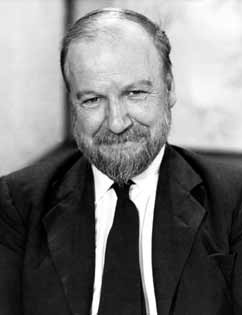William Golding

Sir William
Gerald Golding (19 September 1911 – 19 June 1993) was a British
novelist, poet, playwright and Nobel Prize for Literature laureate, best known
for his novel Lord of the Flies. He was also awarded the Booker Prize for
literature in 1980 for his novel Rites of Passage, the first book of the
trilogy To the Ends of the Earth.
In 2008, The Times
ranked Golding third on their list of "The 50 greatest British writers
since 1945".
Fiction
Golding's often
allegorical fiction makes broad use of allusions to classical literature,
mythology, and Christian symbolism. No distinct thread unites his novels
(unless it be a fundamental pessimism about humanity), and the subject matter
and technique vary. However his novels are often set in closed communities such
as islands, villages, monasteries, groups of hunter-gatherers, ships at sea or
a pharaoh's court. His first novel, Lord of the Flies (1954; film, 1963 and
1990; play, adapted by Nigel Williams, 1995), dealt with an unsuccessful
struggle against barbarism and war, thus showing the moral ambiguity and
fragility of civilization. It has also been said that it is an allegory of
World War II. The Inheritors (1955) looked back into prehistory, advancing the
thesis that humankind's evolutionary ancestors, "the new people"
(generally identified with Homo sapiens sapiens), triumphed over a gentler race
(generally identified with Neanderthals) as much by violence and deceit as by
natural superiority. The Spire 1964 follows the building (and near collapse) of
a huge spire onto a mediæval cathedral church (generally assumed to be
Salisbury Cathedral); the church and the spire itself act as a potent symbols
both of the dean's highest spiritual aspirations and of his worldly vanities.
His 1956 novel Pincher Martin concerns the last moments of a sailor thrown into
the north Atlantic after his ship is attacked. The structure is echoed by that
of the later Booker Prize winner by Yann Martel, Life of Pi. The 1967 novel The
Pyramid comprises three separate stories linked by a common setting (a small
English town in the 1920s) and narrator. The Scorpion God (1971) is a volume of
three novellas set in a prehistoric African hunter-gatherer band ('Clonk,
Clonk'), an ancient Egyptian court ('The Scorpion God') and the court of a
Roman emperor ('Envoy Extraordinary'). The last of these is a reworking of his
1958 play The Brass Butterfly.
Golding's later novels include Darkness Visible (1979), The Paper Men
(1984), and the comic-historical sea trilogy To the Ends of the Earth,
comprising the Booker Prize-winning Rites of Passage (1980), Close Quarters
(1987), and Fire Down Below (1989).
Borrowed from wikipedia.org
The presentations on the novel "Lord of the Flies".
The full texts of the presenations on the novel "Lord of the Flies".










